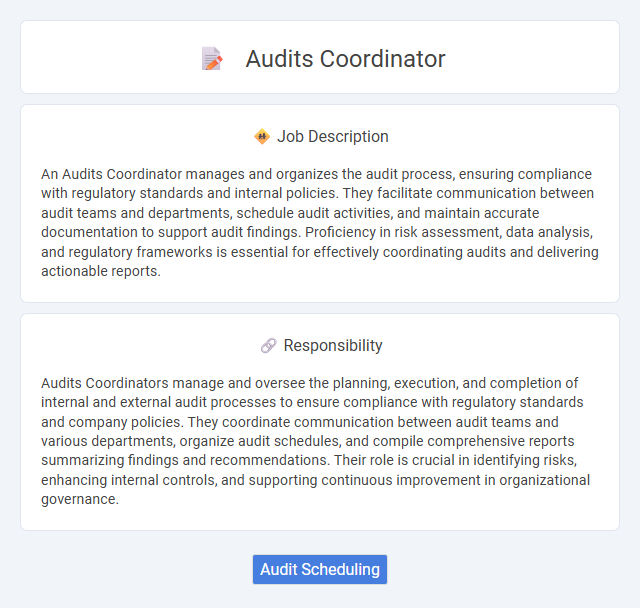
An Audits Coordinator manages and organizes the audit process, ensuring compliance with regulatory standards and internal policies. They facilitate communication between audit teams and departments, schedule audit activities, and maintain accurate documentation to support audit findings. Proficiency in risk assessment, data analysis, and regulatory frameworks is essential for effectively coordinating audits and delivering actionable reports.
Individuals with strong organizational skills and attention to detail are likely well-suited for an Audits Coordinator role, as the job requires managing documentation and coordinating audit schedules efficiently. Those who can handle high-pressure environments and maintain clear communication with diverse teams may find the position a good fit. Candidates lacking these abilities or struggling with multitasking and deadlines might face challenges adapting to the demands of this job.
Qualification
An Audits Coordinator must possess strong analytical skills, a bachelor's degree in accounting, finance, or a related field, and proficiency in auditing software and tools. Experience in managing audit schedules, coordinating teams, and ensuring compliance with regulatory standards is essential. Certification such as CIA (Certified Internal Auditor) or CPA (Certified Public Accountant) enhances credibility and job performance.
Responsibility
Audits Coordinators manage and oversee the planning, execution, and completion of internal and external audit processes to ensure compliance with regulatory standards and company policies. They coordinate communication between audit teams and various departments, organize audit schedules, and compile comprehensive reports summarizing findings and recommendations. Their role is crucial in identifying risks, enhancing internal controls, and supporting continuous improvement in organizational governance.
Benefit
Working as an Audits Coordinator likely offers significant benefits, including the development of strong organizational and analytical skills essential for managing comprehensive audit processes. There is a probability of gaining valuable experience in regulatory compliance and risk assessment, which can enhance career advancement opportunities within finance and quality assurance sectors. The role may also provide a stable work environment with competitive compensation and potential for professional growth.
Challenge
The role of an Audits Coordinator likely involves managing complex audit schedules and ensuring compliance with regulatory standards, which can present significant organizational challenges. Coordinating multi-departmental teams and maintaining clear communication under tight deadlines probably requires strong problem-solving skills and adaptability. The dynamic nature of audit requirements may also demand continuous learning and efficient prioritization to address unforeseen issues effectively.
Career Advancement
Audits Coordinators play a crucial role in managing and streamlining the audit process, ensuring compliance with regulatory standards and internal policies. Mastery in coordinating audit activities and analyzing financial data opens pathways to senior audit management positions, such as Audit Manager or Compliance Officer. Building expertise in risk assessment and regulatory frameworks significantly enhances career growth opportunities within the finance and corporate governance sectors.
Key Terms
Audit Scheduling
An Audits Coordinator is responsible for meticulously managing audit scheduling to ensure timely and efficient execution of internal and external audits. This role involves coordinating auditors' availability, preparing audit timelines, and liaising with various departments to gather necessary documentation and resources. Effective audit scheduling improves compliance adherence and minimizes operational disruptions during audit periods.
 kuljobs.com
kuljobs.com